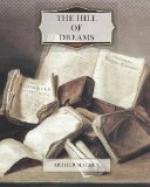in those days that the inner pocket of his coat was
stuffed with papers; he would see Lucian walking up
and down in a secret shady place at the bottom of
the orchard, reading from his sheaf of manuscript,
replacing the leaves, and again drawing them out.
He would walk a few quick steps, and pause as if enraptured,
gazing in the air as if he looked through the shadows
of the world into some sphere of glory, feigned by
his thought. Mr. Taylor was almost alarmed at
the sight; he concluded of course that Lucian was
writing a book. In the first place, there seemed
something immodest in seeing the operation performed
under one’s eyes; it was as if the “make-up”
of a beautiful actress were done on the stage, in
full audience; as if one saw the rounded calves fixed
in position, the fleshings drawn on, the voluptuous
outlines of the figure produced by means purely mechanical,
blushes mantling from the paint-pot, and the golden
tresses well secured by the wigmaker. Books,
Mr. Taylor thought, should swim into one’s ken
mysteriously; they should appear all printed and bound,
without apparent genesis; just as children are suddenly
told that they have a little sister, found by mamma
in the garden. But Lucian was not only engaged
in composition; he was plainly rapturous, enthusiastic;
Mr. Taylor saw him throw up his hands, and bow his
head with strange gesture. The parson began to
fear that his son was like some of those mad Frenchmen
of whom he had read, young fellows who had a sort
of fury of literature, and gave their whole lives to
it, spending days over a page, and years over a book,
pursuing art as Englishmen pursue money, building
up a romance as if it were a business. Now Mr.
Taylor held firmly by the “walking-stick”
theory; he believed that a man of letters should have
a real profession, some solid employment in life.
“Get something to do,” he would have liked
to say, “and then you can write as much as you
please. Look at Scott, look at Dickens and Trollope.”
And then there was the social point of view; it might
be right, or it might be wrong, but there could be
no doubt that the literary man, as such, was not thought
much of in English society. Mr. Taylor knew his
Thackeray, and he remembered that old Major Pendennis,
society personified, did not exactly boast of his nephew’s
occupation. Even Warrington was rather ashamed
to own his connection with journalism, and Pendennis
himself laughed openly at his novel-writing as an
agreeable way of making money, a useful appendage to
the cultivation of dukes, his true business in life.
This was the plain English view, and Mr. Taylor was
no doubt right enough in thinking it good, practical
common sense. Therefore when he saw Lucian loitering
and sauntering, musing amorously over his manuscript,
exhibiting manifest signs that he fine fury which
Britons have ever found absurd, he felt grieved at
heart, and more than ever sorry that he had not been
able to send the boy to Oxford.
“B.N.C. would have knocked all this nonsense out of him,” he thought. “He would have taken a double First like my poor father and made something of a figure in the world. However, it can’t be helped.” The poor man sighed, and lit his pipe, and walked in another part of the garden.




